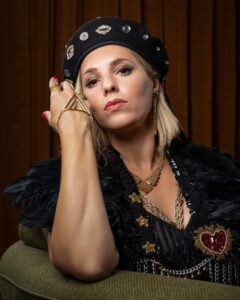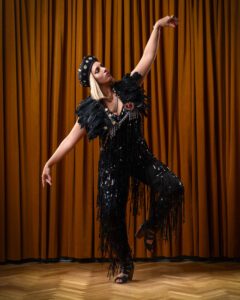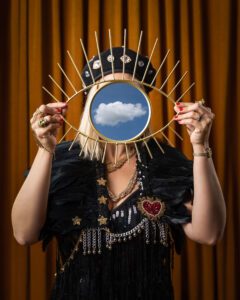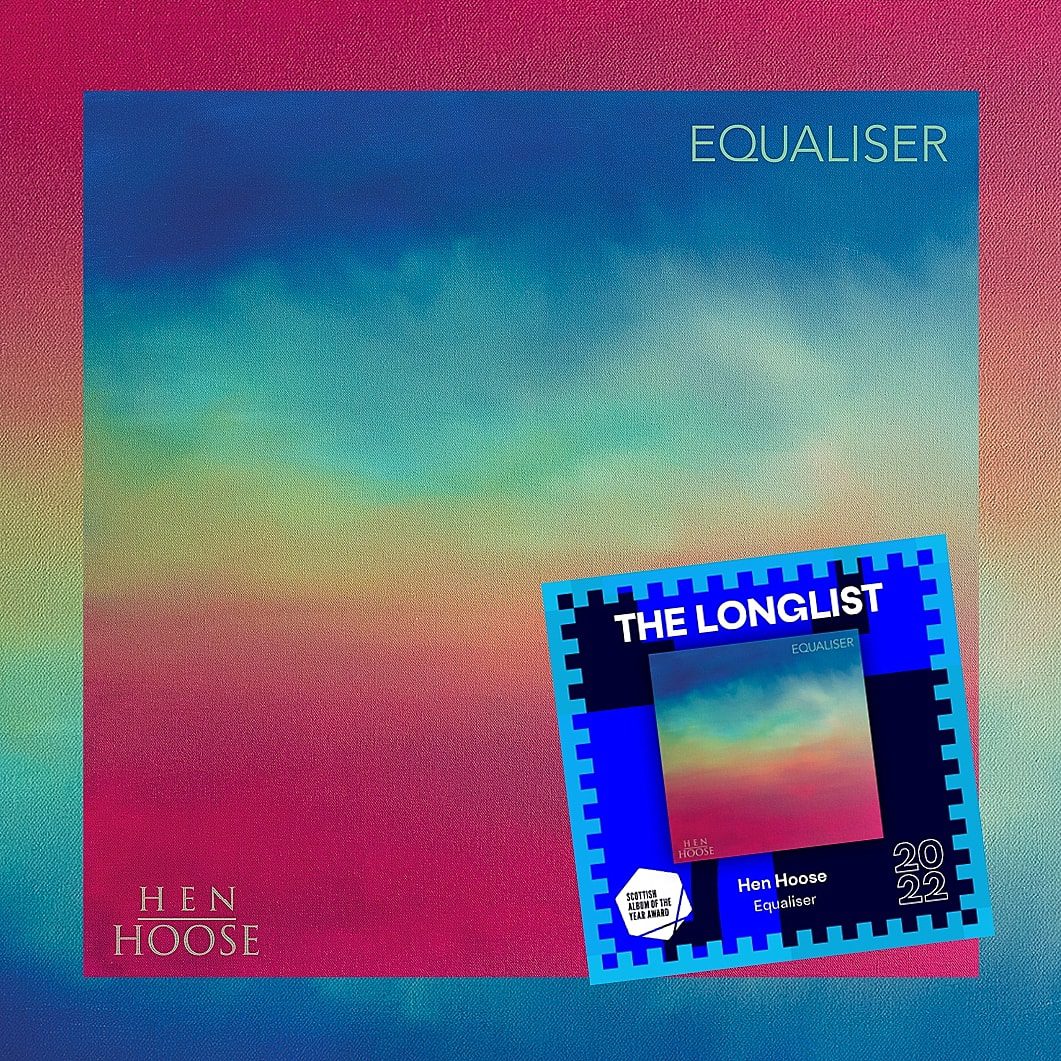As part of our free short course programme, we have been speaking with industry professionals to find out more about their career pathways, current projects and sharing their advice to those just starting out.
 We recently had the chance to meet with Tamara Schlesinger: singer songwriter, record label owner, independent artist (MALKA) and founder of female and non- binary songwriting collective, Hen Hoose.
We recently had the chance to meet with Tamara Schlesinger: singer songwriter, record label owner, independent artist (MALKA) and founder of female and non- binary songwriting collective, Hen Hoose.
Read on to find out more about Tamara industry experience spanning over 20 years, the recent success of the Equaliser album and her advice for budding songwriters.
Looking to develop your skills in songwriting? Why not sign up for one of our free songwriting short courses, taught online and in our Glasgow centre.
Course typically run over 6 sessions, are entirely free to those 14 and over residing in Scotland. Courses are SQA accredited and taught by industry professionals to provide you with the most up to date industry relevant knowledge.
Check out our upcoming Singer Songwriter courses below.
Hi Tamara! Why don’t you introduce yourself?
My name is Tamara Schlesinger. I’m the founder of Hen Hoose, the all female and non-binary songwriting collective based in Glasgow. We work collaboratively writing to briefs for sync, music, TV and film adverts, and also we’ve written an album called Equaliser which is out now. It’s brings together some of the most experienced and successful songwriters in Scotland alongside new up and coming artists as well, which has been amazing. The idea is really to just showcase the talent that we have here in Scotland.
What was the inspiration behind starting the collective?
You don’t have to look very far to see the lack of women on festival lineups and unfortunately the data for female artist signed to major labels is atrocious. Only 17% of writers registered with PRS are women. So I just felt it was time to try and do something about it myself during lockdown. A lot of us had lost our revenue streams from touring. We were a bit lost in general and it gave us a focus and a purpose, to be honest and we ended up forming this beautiful community.
That’s amazing. It’s great to hear about really experienced songwriters working with newer songwriters and collaborating on ideas, giving different perspectives. It’s kind of similar to what we do AMS as well. Connecting experienced musicians with our students full of new ideas.
What have you been working on at the moment with Hen Hoose?
We’ve connected with a lot of the ad agencies in Scotland, we’re currently concentrating on sync because that’s where I have a lot of experience, in writing for TV and film.
I think with Hen Hoose, we’re looking beyond the writing to project production. So a lot of us are producing. We’re encouraging our artists and our writers to move into production or to have the confidence to produce to help combat the stats for women in production. I think only 2% of producer registered at MPG are women. Collaborating is really vital. Most of us are not great at everything. So it’s really good to work with someone else, learn from them. I think using the best of your skill set with someone else is actually a brilliant way of making music.
When you start out in music you just have your dream, your vision. I think sometimes it comes with experience to know that actually working with others can bring out the best in you.
I think there’s a really nice collaborative network in Scotland. Everybody kind of works alongside each other and most are very willing to to connect you with people and welcome you into networks. It is really, really important.
Tell us a little more about your songwriting camp with 23rd Precinct.
The songwriting camp was a Hen Hoose and 23rd Precinct collaboration. The idea was to bring some of our writers on board with some of the 23rd Precinct writers.
They were given 6 hours or so to collaboratively write to this brief, create their track then produce and mix it. On day two we swapped the groups and did the same, so each person came away with two songs that they’d collaborated on.
A lot of it was about development, but also these are active briefs needed in the industry. I think actually from that camp, some of the songs have been pitched already and had some good feedback. The hope is the writers come away inspired. It’s quite a good bonding and networking experience. I think some of the writers have kept in touch and they’re going to work together as well.
That’s so cool. People bouncing ideas around and building up each other’s ideas is really great to see across the board in Scotland at the moment.
When you start out in music you just have your dream, your vision. I think sometimes it comes with experience to know that actually working with others can bring out the best in you.
Tell us a little bit about the Equaliser album and what that experience was like?
Equaliser was a Hen Hoose collaborative project born in lockdown. I’ve run my label for best part of 20 years, I thought “I’ll pop it out on my label if it’s great” and it was beyond great it was just incredible. We did these zoom listening parties together, we were all just left amazed with each song we would hear. I’d be so lucky cause I’d get them early and I’d hear them first. I felt it was too good not to release. I wanted people to hear it.
lockdown. I’ve run my label for best part of 20 years, I thought “I’ll pop it out on my label if it’s great” and it was beyond great it was just incredible. We did these zoom listening parties together, we were all just left amazed with each song we would hear. I’d be so lucky cause I’d get them early and I’d hear them first. I felt it was too good not to release. I wanted people to hear it.
I think what’s really interesting with the project is somehow the record feels cohesive, it runs, it flows even with so many contributors. I think part of that is because we had people write on maybe two or three songs. So a part of them would run through the next song.
Even though it was written through lockdown it’s quite an uplifting record, actually. You’d have people that were just working across genres that they wouldn’t normally. We all got pushed out of our comfort zones. We all were producers. We didn’t know that before. We didn’t classify ourselves as producers because we always go into the studio and there’d be a man twiddling the knobs and they would be the producer. But actually creating all the arrangements on Logic or Ableton we found out we had that skill, we just weren’t crediting ourselves for it.
I love the album, I really am so proud of it. Equaliser has had amazing reviews, lots of play on 6 Music, it’s been a big success so far. Since interviewing, Equaliser has been selected for the Scottish Album of the Year Award Longlist.
It’s enough to make you emotional listening to you speak about what a warm, rewarding process it’s been working together on the project.
Yeah, I was actually crying. I hear the songs and I get quite emotional when we finished and on release day. We were recognised by the John Lennon Foundation for our work for gender equality. So at Christmas we got sent the vinyl of ‘Happy Christmas War is Over’ by John Lennon and Yoko Ono, which was a surprise. My husband had filmed me receiving it, I think he knew that something was coming and it went mini viral.
It was incredible. So we were able to auction that off and raise funds for the project. That’s what we were meant to do with this vinyl. That’s allowed us to bring in this round of artists that are not based in Scotland to work with our Scottish writers which is really exciting.
That’s really amazing. I would be really interested to hear a little bit about your career so far and how you got to here.
I had friends that knew some producers who wanted a singer while I was living down in London. I just went for it and said “I can sing”. I’d never sung in the studio in my life. I sang a cover of ‘Boots Are Made For Walking’ by Nancy Sinatra, and it was used on Lock Stock and Two Smoking Barrels. So it was a really crazy first entrance into music. I started to write my own music and I had a solo album. I was put in touch with Ann Harrison, who has written the definitive music business book [Music: The Business], and she was said “Why are you not just releasing this yourself?” This is 2004.
Not many people released their own music at this point and I could count on one hand how many women were doing it. So I did it and Ann helped me. She guided me, she was my mentor.
That’s when I just started to work on my music and then I eventually had a live band. I started working with the guitarist and we realised we were more of a band than a solo project now. So we named ourselves Six Day Riot. We worked with a producer called Steve Levine, who produced for The Beach Boys and The Culture Club. We did a record of him and lots of majors wanted to sign us. We didn’t end up signing anything. I thought “I’m gonna just release it on my own record label.” I’ve never released with any other label. I run my label and all my own projects. We had music on Skins and SCREAM 4, the Hollywood film and played Glastonbury Festival. Behind it all there’s me running everything.
That sounds like a really great but intense period of time.
 Everyone knows the lead singer is the tour manager, lead songwriter and the label. We protect the work, send the emails, do the admin. Sometimes I’d pretend I had a manager. I’d send emails using my now husbands name trying to negotiate fees. Every so often he’d come to gig and I’m like “Oh, you know that person they’ve just given us some tour dates” and he would have to stand and introduce himself having never spoke to them in his life. Then I left London, had my kids came back to Scotland and went solo, as MALKA.
Everyone knows the lead singer is the tour manager, lead songwriter and the label. We protect the work, send the emails, do the admin. Sometimes I’d pretend I had a manager. I’d send emails using my now husbands name trying to negotiate fees. Every so often he’d come to gig and I’m like “Oh, you know that person they’ve just given us some tour dates” and he would have to stand and introduce himself having never spoke to them in his life. Then I left London, had my kids came back to Scotland and went solo, as MALKA.
Even within that project, the success of my work was sync based. I think that’s why Hen Hoose made sense. So still running my label, I lecture as well in music business and and then Hen Hoose was born. So I kind of have these different hats. I have the business side and the artist side. I’ve released 10 albums of my own stuff across the board from solo to bands to collaborations as well. So yeah that’s kind of the trajectory of my career so far.
That is amazing, you’ve had such a varied career with one resounding theme throughout being having control over your own music.
Yeah you grow in confidence with handling your own work. I don’t use any other name now. I’m just me now. I’ve been doing it long enough that people would know I was lying!
It’s a massive achievement to have put out that many albums while trail blazing that path of self releasing.
My final question would be do you have any advice for anyone wanting to start out as a songwriter / self releasing musician?
You have to grow real confidence. Continue writing. Just write, write, write, write, write. Don’t worry about what genre or what style. Don’t worry about any of that. Just write. Find and discover yourself, connect with people. Go to events like Resonate, they are running networking nights where you just turn up with the guitar, writing and playing songs together. All these things are important and there’s so much available theres something for everyone. So just go find it, don’t sit in your room and hide. Go out and find your people and your own identity as a musician.
You can find out more about about MALKA, Hen Hoose & the free songwriting short course below.
